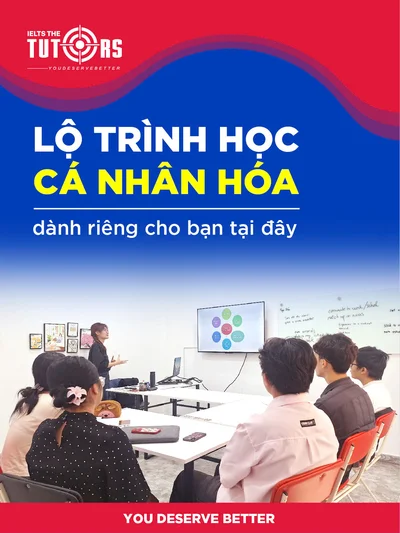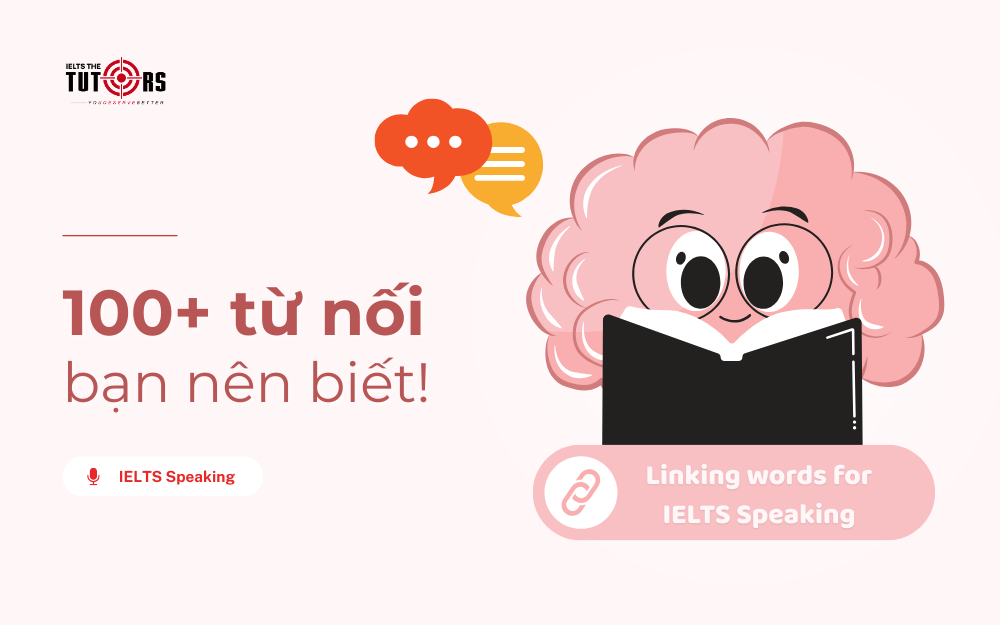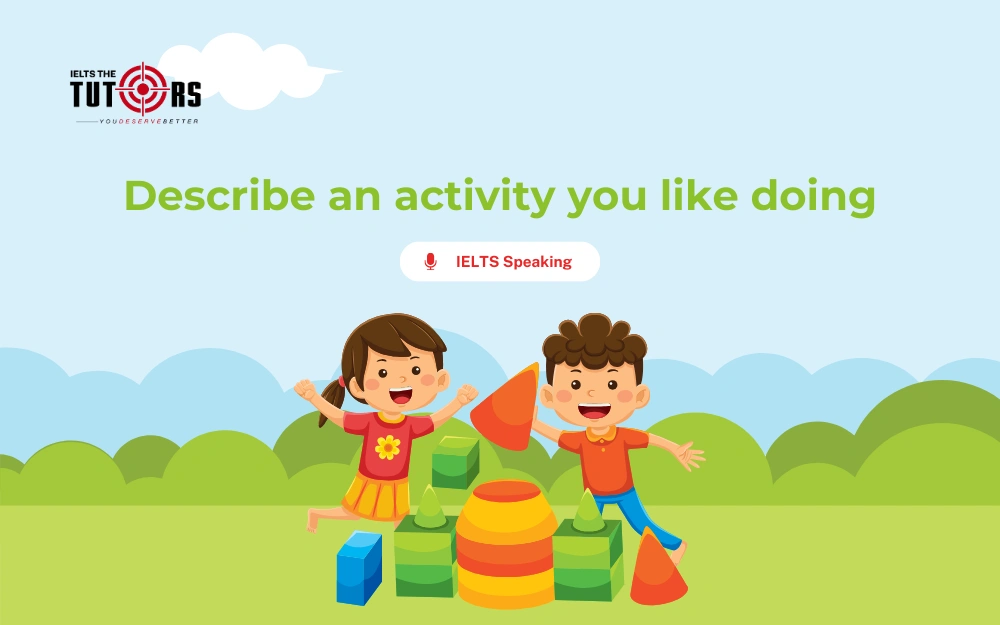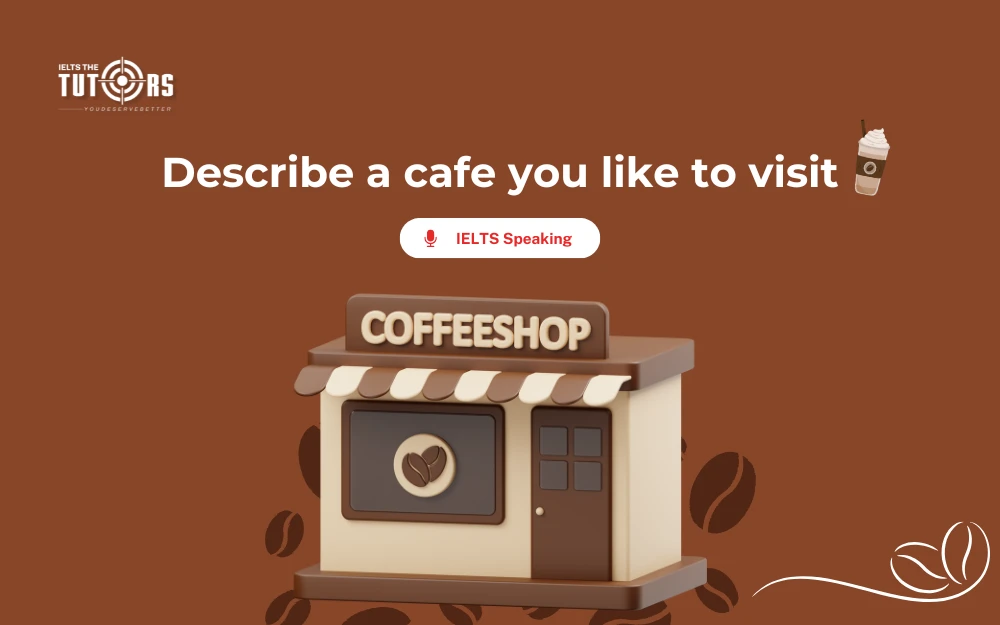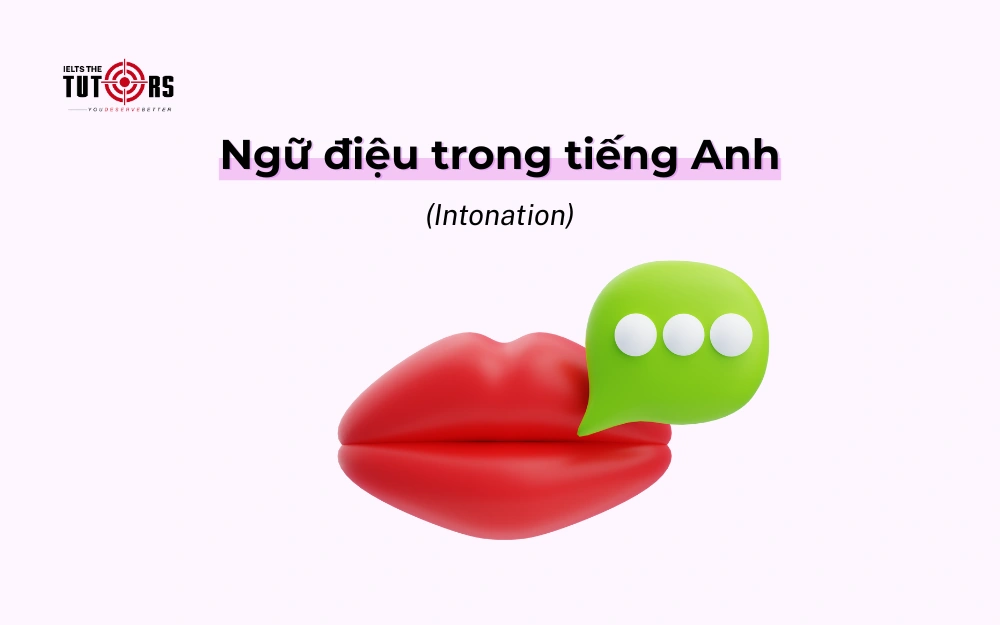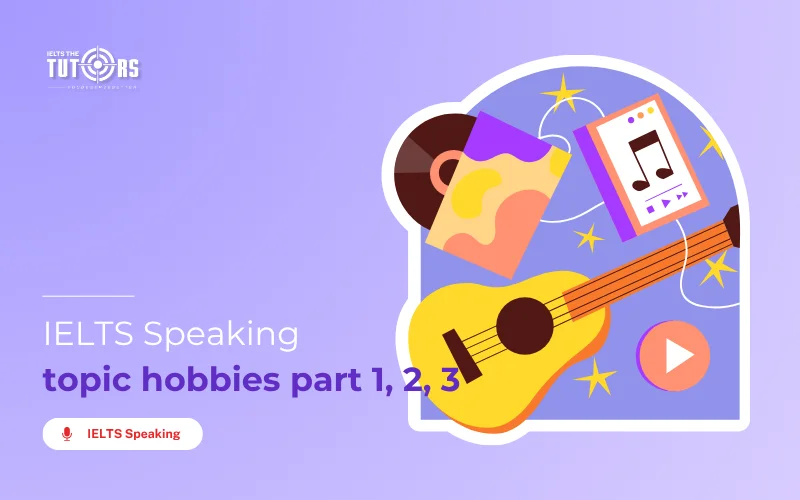
Topic hobbies trong IELTS Speaking là cơ hội để bạn thể hiện khả năng sử dụng tiếng Anh linh hoạt và tự tin trong giao tiếp trước giám khảo về sở thích của bản thân bạn. Dù hobbies là chủ đề khá gần gũi và đơn giản, bạn cũng cần ôn tập lại một chút để chuẩn bị đủ vốn từ vựng, cấu trúc ngữ pháp và biết cách sắp xếp ý tưởng khi trả lời nhé!
Tổng quan về IELTS Speaking topic Hobbies
Topic hobbies là một trong những chủ đề phổ biến trong phần thi IELTS Speaking, xuất hiện thường xuyên ở cả ba phần (Part 1, Part 2 và Part 3). Đây là một chủ đề quen thuộc với thí sinh, mang tính cá nhân, giúp họ dễ dàng nói về sở thích, thói quen và những hoạt động mà họ yêu thích trong thời gian rảnh như Cooking, Photography, Baking, Dancing, …
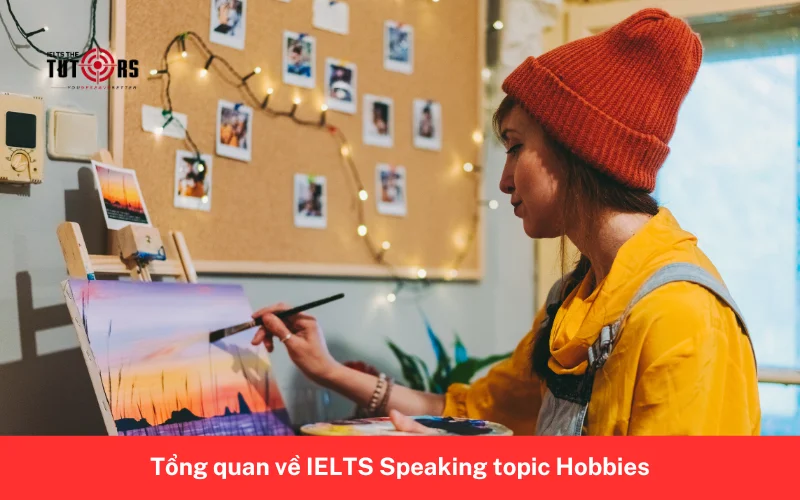
Dưới đây là những câu hỏi phổ biến nhất thường được giám khảo đặt ra trong IELTS Speaking topic hobbies:
- What do you usually do in your free time?
- Do you have any hobbies?
- How did you start that hobby?
- What do you like about your hobby?
- Have your hobbies changed since you were a child?
- What is a popular hobby for children in your country?
- Do you think having hobbies is important for mental health?
- Why do you spend your time doing these activities?
- How do you usually spend your weekends?
Xem thêm: Cấu trúc đề thi IELTS Speaking cập nhật chi tiết mới nhất
Bài mẫu topic hobbies IELTS Speaking part 1
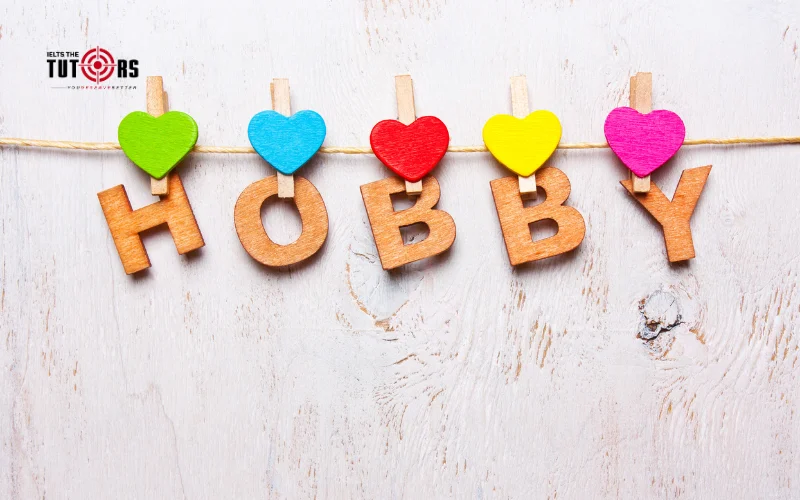
Trong Part 1 của bài thi IELTS Speaking, giám khảo sẽ bắt đầu bằng việc giới thiệu sơ lược về bản thân và yêu cầu bạn giới thiệu về mình. Các câu hỏi sẽ xoay quanh những chủ đề quen thuộc như family, accommodation, education, work và topic hobbies. Phần này nhằm đánh giá khả năng phản xạ nhanh nhạy của thí sinh, cũng như cách trả lời tự nhiên và thoải mái về những chủ đề trong cuộc sống hàng ngày.
Question 1: Do you have any hobbies?
Yes, I do! One of my favorite hobbies is playing badminton. I find it incredibly enjoyable because it not only helps me stay fit but also allows me to bond with friends. I usually play every weekend at a local sports center, and it's a great way to unwind after a hectic week.
Vocabulary:
- Favorite (adj): yêu thích
- Incredibly (adv): cực kỳ
- Enjoyable (adj): thú vị
- Bond (v): gắn kết
- Unwind (v): thư giãn
Question 2: Is it important to have a hobby?
Absolutely! Having a hobby is crucial for maintaining a balanced lifestyle. It provides a break from the daily grind and helps people de-stress. Moreover, hobbies can improve mental health and boost creativity. For example, painting or playing a musical instrument not only nurtures talent but also fosters a sense of accomplishment.
Vocabulary:
- Crucial (adj): quan trọng
- Balanced lifestyle (n): lối sống cân bằng
- Daily grind (n): công việc thường nhật
- De-stress (v): giảm căng thẳng
- Foster (v): thúc đẩy
- Sense of accomplishment (n): cảm giác thành tựu
Question 3: What is a popular hobby for children in your country?
In my country, an extremely popular hobby among children is playing football. It’s a sport that’s loved by almost everyone and can be seen played in schools, parks, and even on the streets. It’s not only fun but also teaches kids how to work as a team and be disciplined.
Vocabulary:
- Popular (adj): phổ biến
- Loved by (phr): được yêu thích bởi
- Teamwork (n): làm việc nhóm
- Discipline (n): kỷ luật
- Life skills (n): kỹ năng sống
Question 4: Do you spend more time on your hobbies now than in the past?
Not really. I actually spent more time on my hobbies when I was younger because I had fewer responsibilities. Nowadays, my work schedule is quite demanding, leaving me with limited time for leisure activities. However, I still try to set aside some time for my hobbies whenever possible, as they help me recharge.
Vocabulary:
- Responsibility (n): trách nhiệm
- Demanding (adj): đòi hỏi nhiều
- Leisure activities (n): các hoạt động giải trí
- Set aside (v): dành ra
- Recharge (v): nạp năng lượng
Question 5: Are there any hobbies you’d like to try in the future?
Yes, I’d love to try gardening in the future. It seems like a peaceful and rewarding hobby where I can grow my own fruits and vegetables. Besides, it’s a great way to connect with nature and develop patience, which is something I need to work on.
Vocabulary:
- Peaceful (adj): yên bình
- Rewarding (adj): đáng giá
- Connect with (v): kết nối với
- Develop patience (phr): rèn luyện sự kiên nhẫn
- Work on (phr): cải thiện
Xem thêm: Bài mẫu IELTS Speaking topic study part 1, 2, 3 kèm từ vựng
Bài mẫu IELTS Speaking topic Hobbies – part 2
Trong IELTS Speaking Part 2, bạn sẽ được giám khảo cung cấp một cue card với một chủ đề cụ thể và có 1 phút để chuẩn bị trước khi nói trong khoảng 2 phút. Chẳng hạn, nếu đề bài yêu cầu bạn miêu tả một sở thích với chủ đề “Describe a hobby you enjoy”, bạn có thể tham khảo bài mẫu dưới đây:
Cue Card 1: Describe a hobby you enjoy (Reading)
One of my favorite hobbies is reading, which I’ve been passionate about since childhood. I particularly enjoy reading novels and self-help books because they allow me to explore different perspectives and gain valuable insights into life. I usually dedicate an hour before bedtime to this hobby, as it helps me relax and wind down after a busy day.
What I love most about reading is its ability to transport me to different worlds. Through novels, I can experience the adventures of fictional characters, while self-help books provide me with practical knowledge and advice that I can apply in real life.
Reading has significantly improved my life in many ways. For instance, it has expanded my vocabulary and improved my critical thinking skills. Additionally, it’s a fantastic way to reduce stress and gain a fresh outlook on problems. I believe this hobby has made me a more well-rounded and empathetic person over the years.
Vocabulary:
- Passionate about (adj): đam mê
- Perspective (n): góc nhìn
- Gain insights (phr): thu được hiểu biết
- Wind down (phr): thư giãn
- Transport (v): đưa (đến một nơi khác)
- Fictional (adj): hư cấu
- Practical knowledge (n): kiến thức thực tế
- Expand vocabulary (phr): mở rộng vốn từ
- Critical thinking skills (n): kỹ năng tư duy phản biện
- Well-rounded (adj): toàn diện
- Empathetic (adj): đồng cảm
Cue card 2: Describe a hobby you enjoy (Cooking)
A hobby that I thoroughly enjoy is cooking. I started learning how to cook during my teenage years, and it has since become one of my favorite pastimes. I typically cook every evening, as it’s a wonderful way to unwind after work and ensure that I’m eating healthy, home-cooked meals.
Cooking is an incredibly satisfying hobby because it allows me to express my creativity. I love experimenting with different ingredients and trying out new recipes, especially dishes from international cuisines like Italian or Japanese. It’s always rewarding to see my efforts come together in a delicious meal that I can share with my family.
This hobby has had a positive impact on my life. Not only has it improved my diet and overall health, but it has also boosted my confidence in the kitchen. Furthermore, cooking for others has strengthened my relationships with friends and family, as we often bond over meals. I feel that this hobby is both practical and deeply fulfilling.
Vocabulary:
- Thoroughly (adv): hoàn toàn
- Pastime (n): sở thích, thú vui
- Unwind (phr): thư giãn
- Home-cooked meals (n): bữa ăn tự nấu
- Express creativity (phr): thể hiện sự sáng tạo
- Experiment with (phr): thử nghiệm với
- International cuisine (n): ẩm thực quốc tế
- Rewarding (adj): đáng giá
- Boost confidence (phr): nâng cao sự tự tin
- Strengthen relationships (phr): củng cố mối quan hệ
- Bond over (phr): gắn kết qua
Bài mẫu IELTS Speaking topic Hobbies – part 3
Giám khảo sẽ đặt ra các câu hỏi xoáy sâu vào topic hobbies mà bạn đã trình bày ở Part 2:
Question 1: How do people’s hobbies change as they get older?
As people age, their hobbies often evolve due to changes in their interests, lifestyle, and physical abilities. For instance, younger individuals might prefer more physically demanding hobbies like playing football or dancing, while older people might shift towards more relaxed activities such as gardening or knitting. Additionally, as people grow older, they might also have more time to dedicate to hobbies that they previously couldn’t pursue due to work or family commitments. For example, someone might take up learning a musical instrument or cooking gourmet meals. These changes in hobbies reflect the different stages of life and the varying needs and interests that come with age.
Vocabulary:
- Evolve (v): phát triển, tiến hóa
- Physical abilities (n): khả năng thể chất
- Demanding (adj): đòi hỏi, yêu cầu nhiều nỗ lực
- Shift towards (phrasal verb): chuyển sang, thay đổi sang
- Gardening (n): làm vườn
- Knitting (n): đan len
- Dedicate to (phrasal verb): dành thời gian cho
- Pursue (v): theo đuổi, tìm kiếm
- Commitments (n): cam kết, trách nhiệm
- Gourmet (adj): tinh tế (thường dùng cho ẩm thực)
- Reflect (v): phản ánh
- Stages of life (n): các giai đoạn của cuộc đời
- Varying (adj): thay đổi, khác nhau
Question 2: Do you think having a hobby is beneficial for children? Why?
Absolutely, I believe having a hobby is highly beneficial for children. Engaging in hobbies allows them to develop important life skills such as time management, creativity, and problem-solving. For instance, children who enjoy drawing or painting can improve their artistic abilities while also learning how to express themselves better. Additionally, hobbies can serve as a great way for kids to reduce stress, especially in today’s world where academic pressure is quite high. Moreover, participating in hobbies often encourages social interaction, as children may join clubs or groups, which helps them build friendships and improve their communication skills.
Vocabulary:
- Beneficial (adj): có lợi
- Life skills (n): kỹ năng sống
- Time management (n): quản lý thời gian
- Creativity (n): sự sáng tạo
- Problem-solving (n): giải quyết vấn đề
- Express oneself (phr): thể hiện bản thân
- Academic pressure (n): áp lực học tập
- Social interaction (n): tương tác xã hội
- Communication skills (n): kỹ năng giao tiếp
Question 3: How do modern technologies influence the way people spend their leisure time?
Modern technologies have significantly transformed the way people spend their leisure time. Nowadays, many individuals use smartphones, tablets, or laptops to watch movies, play online games, or scroll through social media platforms. While this has made entertainment more accessible and convenient, it also has its downsides. For example, excessive use of technology can lead to reduced physical activity and a lack of face-to-face interaction. On the other hand, technology has also introduced innovative hobbies, such as video editing, blogging, or digital art, which allow people to develop new skills. Overall, technology has both positively and negatively influenced how we utilize our free time.
Vocabulary:
- Transform (v): thay đổi
- Leisure time (n): thời gian rảnh rỗi
- Social media platforms (n): nền tảng mạng xã hội
- Accessible (adj): dễ tiếp cận
- Convenient (adj): tiện lợi
- Excessive use (phr): việc sử dụng quá mức
- Face-to-face interaction (n): tương tác trực tiếp
- Innovative (adj): sáng tạo, đổi mới
- Utilize (v): sử dụng
Question 4: Are hobbies different for men and women in your country?
Yes, there are some differences in the hobbies preferred by men and women in my country, though these distinctions are becoming less pronounced over time. Traditionally, men tend to enjoy sports like football or basketball, while women often gravitate toward creative hobbies such as knitting, cooking, or crafting. However, in recent years, these gender stereotypes have begun to fade. Nowadays, it’s not uncommon to see women participating in fitness activities like weightlifting or men exploring hobbies such as baking or gardening. This shift reflects a more progressive society where people feel free to pursue their interests regardless of gender norms.
Vocabulary:
- Distinction (n): sự khác biệt
- Pronounced (adj): rõ rệt
- Gravitate toward (phr): hướng đến
- Creative hobbies (n): sở thích mang tính sáng tạo
- Gender stereotypes (n): định kiến giới tính
- Fade (v): phai nhạt
- Fitness activities (n): hoạt động thể chất
- Weightlifting (n): cử tạ
- Progressive (adj): tiến bộ
- Gender norms (n): chuẩn mực giới tính
Question 5: How have hobbies changed in your country over the past few decades?
Hobbies in my country have evolved dramatically over the past few decades, largely due to advancements in technology and changes in lifestyle. In the past, people favored traditional hobbies such as gardening, reading books, or playing outdoor games. However, with the rise of the internet and digital devices, many people now spend their free time on activities like online gaming, streaming TV shows, or exploring social media. Furthermore, modern hobbies often involve a combination of technology and creativity, such as photography or digital design. While these changes offer more diverse options, they also mean that people are spending less time on physical and outdoor activities.
Vocabulary:
- Evolve (v): phát triển, tiến hóa
- Advancement (n): sự tiến bộ
- Lifestyle (n): lối sống
- Favor (v): ưa chuộng
- Traditional hobbies (n): sở thích truyền thống
- Digital devices (n): thiết bị kỹ thuật số
- Streaming (v): phát trực tuyến
- Diverse options (n): lựa chọn đa dạng
- Physical activities (n): hoạt động thể chất
- Outdoor activities (n): hoạt động ngoài trời
Từ vựng thông dụng dùng cho IELTS Speaking topic hobbies
| Từ vựng | Phiên âm | Loại từ | Ý nghĩa |
| Hobby | /ˈhɒbi/ | (n) | sở thích |
| Leisure activity | /ˈliːʒə(r) əˈktɪvɪti/ | (n) | hoạt động giải trí |
| Pastime | /ˈpɑːstaɪm/ | (n) | thú vui, sở thích |
| Recreation | /ˌriːkrɪˈeɪʃən/ | (n) | giải trí |
| Pursuit | /pəˈsjuːt/ | (n) | hoạt động theo đuổi sở thích |
| Collecting | /kəˈlɛktɪŋ/ | (n) | sưu tầm |
| Gardening | /ˈɡɑːdnɪŋ/ | (n) | làm vườn |
| Photography | /fəˈtɒɡrəfi/ | (n) | nhiếp ảnh |
| Painting | /ˈpeɪntɪŋ/ | (n) | hội họa |
| Cooking | /ˈkʊkɪŋ/ | (n) | nấu ăn |
| Reading | /ˈriːdɪŋ/ | (n) | đọc sách |
| Playing musical instruments | /ˈpleɪɪŋ ˈmjuːzɪkəl ˈɪnstrəmənts/ | (phr) | chơi nhạc cụ |
| Crafting | /ˈkrɑːftɪŋ/ | (n) | làm đồ thủ công |
| Writing | /ˈraɪtɪŋ/ | (n) | viết lách |
| Hiking | /ˈhaɪkɪŋ/ | (n) | đi bộ đường dài |
| Fishing | /ˈfɪʃɪŋ/ | (n) | câu cá |
| Gaming | /ˈɡeɪmɪŋ/ | (n) | chơi game |
| Dancing | /ˈdɑːnsɪŋ/ | (n) | nhảy múa |
| Blogging | /ˈblɒɡɪŋ/ | (n) | viết blog |
| Digital art | /ˈdɪdʒɪtl ɑːt/ | (n) | nghệ thuật kỹ thuật số |
| Outdoor activities | /ˈaʊtdɔːr ækˈtɪvɪtiz/ | (n) | các hoạt động ngoài trời |
| Camping | /ˈkæmpɪŋ/ | (n) | cắm trại |
| Cycling | /ˈsaɪklɪŋ/ | (n) | đạp xe |
| Rock climbing | /rɒk ˈklaɪmɪŋ/ | (n) | leo núi đá |
| Running | /ˈrʌnɪŋ/ | (n) | chạy bộ |
| Birdwatching | /ˈbɜːdwɒtʃɪŋ/ | (n) | ngắm chim |
| Photography walks | /fəˈtɒɡrəfi wɔːks/ | (phr) | đi bộ chụp ảnh |
| Nature exploration | /ˈneɪtʃər ˌɛksplɒˈreɪʃən/ | (n) | khám phá thiên nhiên |
| Team sports | /tiːm spɔːts/ | (n) | các môn thể thao đồng đội |
| Club activities | /klʌb ækˈtɪvɪtiz/ | (n) | hoạt động câu lạc bộ |
| Volunteering | /ˌvɒlənˈtɪərɪŋ/ | (n) | tình nguyện |
| Board games | /bɔːd ɡeɪmz/ | (n) | các trò chơi trên bàn cờ |
| Networking events | /ˈnɛtwɜːkɪŋ ɪˈvɛnts/ | (n) | sự kiện kết nối |
| Aspire to | /əˈspaɪə(r) tuː/ | (v) | khao khát làm gì |
| Take up | /teɪk ʌp/ | (phr v) | bắt đầu một sở thích mới |
| Try out | /traɪ aʊt/ | (phr v) | thử một hoạt động mới |
| Explore | /ɪkˈsplɔːr/ | (v) | khám phá |
| Broaden horizons | /ˈbrɔːdn hɪˈraɪzənz/ | (phr) | mở rộng tầm nhìn |
| Set a goal | /sɛt ə ɡəʊl/ | (phr) | đặt mục tiêu |
| Get lost in | /ɡɛt lɒst ɪn/ | (phr) | đắm chìm vào điều gì đó |
| A breath of fresh air | /ə brɛθ əv frɛʃ ɛə(r)/ | (idiom) | một sự thay đổi mới mẻ |
| Recharge one’s batteries | /rɪˈtʃɑːdʒ wʌnz ˈbætəriz/ | (idiom) | nạp lại năng lượng |
| Escape the hustle and bustle | /ɪˈskeɪp ðə ˈhʌsl ənd ˈbʌsəl/ | (phr) | thoát khỏi sự ồn ào và náo nhiệt |
| A change of pace | /ə tʃeɪndʒ əv peɪs/ | (idiom) | sự thay đổi nhịp sống |
Xem thêm: Hướng dẫn cách luyện Speaking tại nhà cho người mới bắt đầu
Một số cụm từ và idioms hay về topic hobbies
| Cụm từ | Ỹ nghĩa | Ví dụ |
| Get lost in | Đắm chìm vào điều gì đó | I often get lost in reading books when I need to relax. |
| A breath of fresh air | Một sự thay đổi mới mẻ | After months of stressful work, a vacation was like a breath of fresh air. |
| Recharge one’s batteries | Nạp lại năng lượng | I love to recharge my batteries by spending weekends in the countryside. |
| Escape the hustle and bustle | Thoát khỏi sự ồn ào và náo nhiệt | I enjoy going to the mountains to escape the hustle and bustle of city life. |
| A change of pace | Sự thay đổi nhịp sống | Taking up painting has been a real change of pace for me. |
| To unwind and relax | Thư giãn, nghỉ ngơi | I unwind and relax by watching my favorite TV shows. |
| To be hooked on + sth… | Nghiện một sở thích, hoạt động nào đó | I've become hooked on photography since I bought my new camera. |
| To be in the zone | Rất tập trung vào công việc, sở thích | When I play the piano, I’m completely in the zone, forgetting everything around me. |
| I am fond of… | Tôi rất thích | I am fond of hiking because it allows me to connect with nature. |
| I am passionate about… | Tôi đam mê | I am passionate about cooking and trying new recipes. |
| I take up… as a hobby | Tôi bắt đầu … như một sở thích | I took up gardening as a hobby during the lockdown. |
| I spend most of my time… | Tôi dành phần lớn thời gian của mình | I spend most of my time drawing or sketching in my sketchbook. |
| I relax by + V-ing | Tôi thư giãn, giải trí bằng… | I relax by reading novels in my spare time. |
IELTS The Tutors hy vọng rằng qua bài viết này, bạn sẽ biết cách vận dụng từ vựng một cách chính xác và phù hợp với topic hobbies (sở thích) trong bài thi IELTS Speaking, từ đó đạt được kết quả như mong đợi. Đừng quên tiếp tục trau dồi kiến thức và luyện tập với những đề thi mẫu mới nhất để chinh phục điểm số cao nhất nhé!

